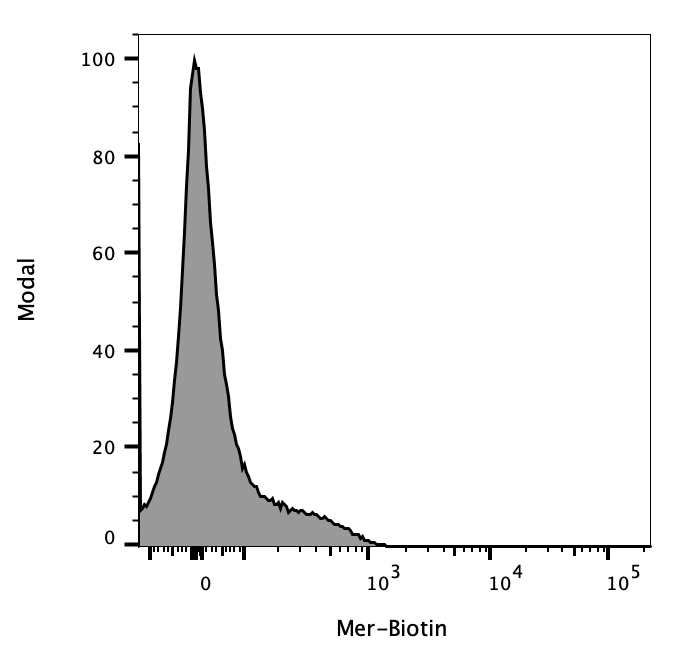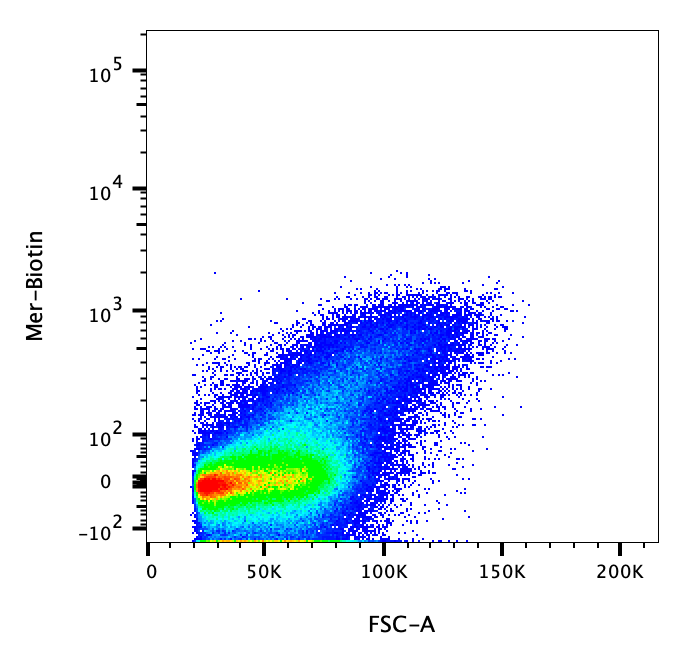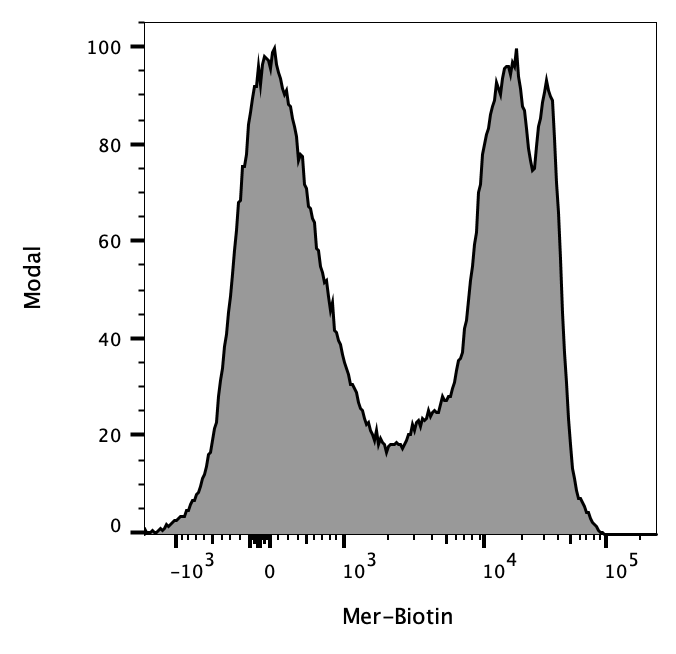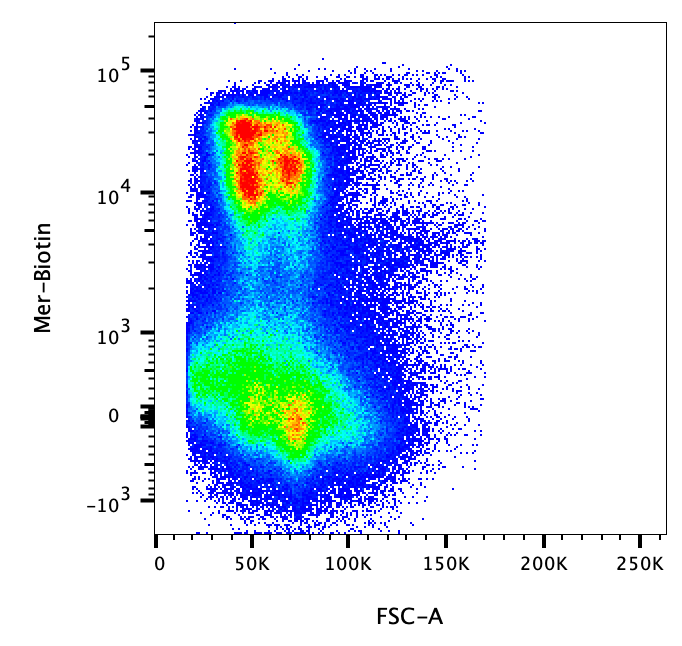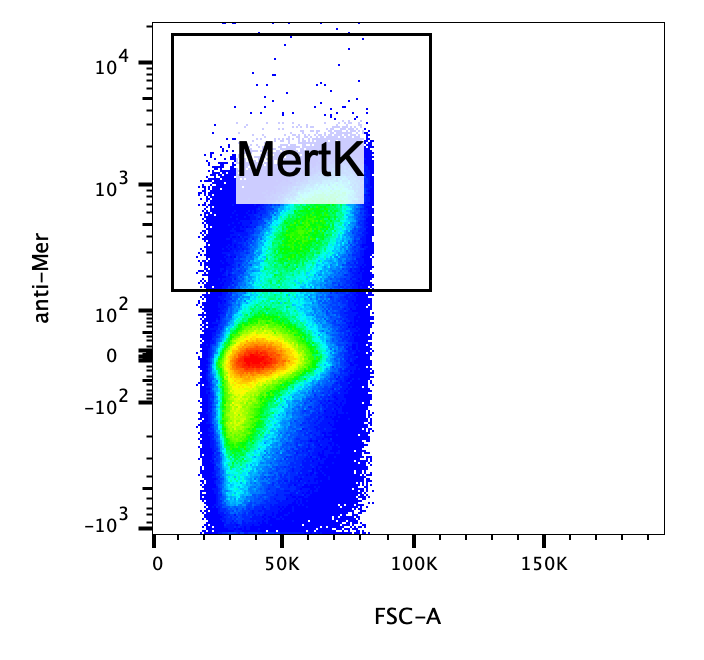Mouse Mer Biotinylated Antibody Summary
Glu23-Phe498
Accession # Q60805
Applications
Please Note: Optimal dilutions should be determined by each laboratory for each application. General Protocols are available in the Technical Information section on our website.
Scientific Data
 View Larger
View Larger
Detection of Mer in J774A.1 Mouse Cell line by Flow Cytometry. J774A.1 mouse reticulum cell sarcoma macrophage cell line was stained with Goat Anti-Mouse Mer Biotinylated Antigen Affinity-purified Polyclonal Antibody (Catalog # BAF591, filled histogram) or isotype control antibody (Catalog # BAF108, open histogram), followed by Streptavidin-Allophycocyanin (Catalog # F0050). View our protocol for Staining Membrane-associated Proteins.
Preparation and Storage
- 12 months from date of receipt, -20 to -70 °C as supplied.
- 1 month, 2 to 8 °C under sterile conditions after reconstitution.
- 6 months, -20 to -70 °C under sterile conditions after reconstitution.
Background: Mer
Axl (Ufo, Ark), Dtk (Sky, Tyro3, Rse, Brt) and Mer (human and mouse homologues of chicken c-Eyk) constitute a receptor tyrosine kinase subfamily. The extracellular domains of these proteins contain two Ig-like motifs and two fibronectin type III motifs. This characteristic topology is also found in neural cell adhesion molecules and in receptor tyrosine phosphatases. These receptors bind the vitamin K-dependent protein growth-arrest-specific gene 6 (Gas6) which is structurally related to the anticoagulation factor protein S. Binding of Gas6 induces receptor autophosphorylation and downstream signaling pathways that can lead to cell proliferation, migration or the prevention of apoptosis. Studies suggest that this family of tyrosine kinase receptors may be involved in hematopoiesis, embryonic development, tumorigenesis and regulation of testicular functions (1, 2).
- Nagata, K. et al. (1996) J. Biol. Chem. 22:30022.
- Crosier, K.E. and P.S Crosier (1997) Pathology 29:131.
Product Datasheets
Citations for Mouse Mer Biotinylated Antibody
R&D Systems personnel manually curate a database that contains references using R&D Systems products. The data collected includes not only links to publications in PubMed, but also provides information about sample types, species, and experimental conditions.
24
Citations: Showing 1 - 10
Filter your results:
Filter by:
-
The Akt-mTORC1 pathway mediates Axl receptor tyrosine kinase-induced mesangial cell proliferation
Authors: Y Zhen, TL McGaha, FD Finkelman, WH Shao
Journal of leukocyte biology, 2021-07-04;0(0):.
-
Efferocytes release extracellular vesicles to resolve inflammation and tissue injury via prosaposin-GPR37 signaling
Authors: Bhattacharya, P;Dhawan, UK;Hussain, MT;Singh, P;Bhagat, KK;Singhal, A;Austin-Williams, S;Sengupta, S;Subramanian, M;
Cell reports
Species: Mouse
Sample Types: Whole Cells
Applications: Flow Cytometry -
Pomegranate Peel Extract Decreases Plaque Necrosis and Advanced Atherosclerosis Progression in Apoe -/- Mice
Authors: Vijayprakash Manickam, Umesh Kumar Dhawan, Damanpreet Singh, Mahesh Gupta, Manikandan Subramanian
Frontiers in Pharmacology
-
STAT5 is activated in macrophages by breast cancer cell-derived factors and regulates macrophage function in the tumor microenvironment
Authors: Emily A. Jesser, Nicholas J. Brady, Danielle N. Huggins, Patrice M. Witschen, Christine H. O’Connor, Kathryn L. Schwertfeger
Breast Cancer Research
-
Human and Mouse Transcriptome Profiling Identifies Cross-Species Homology in Pulmonary and Lymph Node Mononuclear Phagocytes
Authors: SM Leach, SL Gibbings, AD Tewari, SM Atif, B Vestal, T Danhorn, WJ Janssen, TD Wager, CV Jakubzick
Cell Rep, 2020-11-03;33(5):108337.
Species: Mouse
Sample Types: Whole Cells
Applications: Cell Culture -
Reticular Fibroblasts Expressing the Transcription Factor WT1 Define a Stromal Niche that Maintains and Replenishes Splenic Red Pulp Macrophages
Authors: Alicia Bellomo, Isabelle Mondor, Lionel Spinelli, Marine Lagueyrie, Benjamin J. Stewart, Nicolas Brouilly et al.
Immunity
-
Phagocytosis of Wnt inhibitor SFRP4 by late wound macrophages drives chronic Wnt activity for fibrotic skin healing
Authors: D Gay, G Ghinatti, CF Guerrero-J, RA Ferrer, F Ferri, CH Lim, S Murakami, N Gault, V Barroca, I Rombeau, P Mauffrey, L Irbah, E Treffeisen, S Franz, A Boissonnas, C Combadière, M Ito, MV Plikus, PH Romeo
Sci Adv, 2020-03-20;6(12):eaay3704.
Species: Mouse
Sample Types: Whole Cells
Applications: ICC -
The Kidney Contains Ontogenetically Distinct Dendritic Cell and Macrophage Subtypes throughout Development That Differ in Their Inflammatory Properties
Authors: Natallia Salei, Stephan Rambichler, Johanna Salvermoser, Nikos E. Papaioannou, Ronja Schuchert, Dalia Pakalniškytė et al.
Journal of the American Society of Nephrology
-
Sensing of apoptotic cells through Axl causes lung basal cell proliferation in inflammatory diseases
Authors: Naoya Fujino, Oliver J. Brand, David J. Morgan, Toshifumi Fujimori, Aleksander M. Grabiec, Christopher P. Jagger et al.
Journal of Experimental Medicine
-
Lymphatic Endothelial Cells Are Essential Components of the Subcapsular Sinus Macrophage Niche
Authors: Isabelle Mondor, Myriam Baratin, Marine Lagueyrie, Lisa Saro, Sandrine Henri, Rebecca Gentek et al.
Immunity
-
MERTK tyrosine kinase receptor together with TIM4 phosphatidylserine receptor mediates distinct signal transduction pathways for efferocytosis and cell proliferation
Authors: C Nishi, Y Yanagihash, K Segawa, S Nagata
J. Biol. Chem., 2019-03-07;0(0):.
Species: Mouse
Sample Types: Cell Lysates, Whole Cells
Applications: Flow Cytometry, Immunoprecipitation, Western Blot -
Interferon induced protein 35 exacerbates H5N1 influenza disease through the expression of IL-12p40 homodimer
Authors: AP Gounder, CC Yokoyama, NN Jarjour, TL Bricker, BT Edelson, ACM Boon
PLoS Pathog., 2018-04-26;14(4):e1007001.
Species: Mouse
Sample Types: Whole Cells
Applications: Flow Cytometry -
Conventional DCs from Male and Female Lupus-Prone B6.NZM Sle1/Sle2/Sle3 Mice Express an IFN Signature and Have a Higher Immunometabolism That Are Enhanced by Estrogen
Authors: MH Lee, M Chakhtoura, U Sriram, R Caricchio, S Gallucci
J Immunol Res, 2018-04-15;2018(0):1601079.
Species: Mouse
Sample Types: Whole Cells
Applications: Flow Cytometry -
A Discrete Subset of Monocyte-Derived Cells among Typical Conventional Type 2 Dendritic Cells Can Efficiently Cross-Present
Authors: J Sheng, Q Chen, I Soncin, SL Ng, K Karjalaine, C Ruedl
Cell Rep, 2017-10-31;21(5):1203-1214.
Species: Mouse
Sample Types: Whole Cells
Applications: Flow Cytometry -
Mouse macrophages show different requirements for phosphatidylserine receptor Tim4 in efferocytosis
Authors: Y Yanagihash, K Segawa, R Maeda, YI Nabeshima, S Nagata
Proc. Natl. Acad. Sci. U.S.A., 2017-08-02;0(0):.
Species: Mouse
Sample Types: Cell Lysates
Applications: Western Blot -
Pivotal role for skin trans-endothelial radio-resistant anti-inflammatory macrophages in tissue repair
Authors: Olga Barreiro
Elife, 2016-06-15;5(0):.
Species: Mouse
Sample Types: Tissue Homogenates
Applications: Flow Cytometry -
The orphan nuclear receptor Nr4a1 couples sympathetic and inflammatory cues in CNS-recruited macrophages to limit neuroinflammation
Authors: Iftach Shaked, Richard N. Hanna, Helena Shaked, Grzegorz Chodaczek, Heba N. Nowyhed, George Tweet et al.
Nature Immunology
-
DNA-Mediated Cyclic GMP-AMP Synthase-Dependent and -Independent Regulation of Innate Immune Responses.
Authors: Motani K, Ito S, Nagata S
J Immunol, 2015-04-08;194(10):4914-23.
Species: Mouse
Sample Types: Whole Cells
Applications: Flow Cytometry -
The Axl receptor tyrosine kinase is a discriminator of macrophage function in the inflamed lung.
Authors: Fujimori T, Grabiec A, Kaur M, Bell T, Fujino N, Cook P, Svedberg F, MacDonald A, Maciewicz R, Singh D, Hussell T
Mucosal Immunol, 2015-01-21;8(5):1021-30.
Species: Mouse
Sample Types: BALF
Applications: Flow Cytometry -
Progressive replacement of embryo-derived cardiac macrophages with age
Authors: Kaaweh Molawi, Yochai Wolf, Prashanth K. Kandalla, Jeremy Favret, Nora Hagemeyer, Kathrin Frenzel et al.
Journal of Experimental Medicine
-
Lymph-borne CD8alpha+ dendritic cells are uniquely able to cross-prime CD8+ T cells with antigen acquired from intestinal epithelial cells.
Authors: Cerovic V, Houston S, Westlund J, Utriainen L, Davison E, Scott C, Bain C, Joeris T, Agace W, Kroczek R, Mowat A, Yrlid U, Milling S
Mucosal Immunol, 2014-05-21;8(1):38-48.
Species: Mouse
Sample Types: Whole Cells
Applications: Flow Cytometry -
MerTK-mediated engulfment of pyrenocytes by central macrophages in erythroblastic islands.
Authors: Toda S, Segawa K, Nagata S
Blood, 2014-03-21;123(25):3963-71.
Species: Mouse
Sample Types: Whole Cells
Applications: FACS -
Distinct development and functions of resident and recruited liver Kupffer cells/macrophages.
Authors: Ikarashi M, Nakashima H, Kinoshita M, Sato A, Nakashima M, Miyazaki H, Nishiyama K, Yamamoto J, Seki S
J Leukoc Biol, 2013-08-20;94(6):1325-36.
Species: Mouse
Sample Types: Whole Cells
Applications: Flow Cytometry -
Gene-expression profiles and transcriptional regulatory pathways that underlie the identity and diversity of mouse tissue macrophages
Authors: Emmanuel L. Gautier, Tal the Immunological Genome Consortium, Jennifer Miller, Jennifer Miller, Melanie Jakubzick, Claudia Jakubzick et al.
Nature Immunology
FAQs
No product specific FAQs exist for this product, however you may
View all Antibody FAQsReviews for Mouse Mer Biotinylated Antibody
Average Rating: 4.1 (Based on 7 Reviews)
Have you used Mouse Mer Biotinylated Antibody?
Submit a review and receive an Amazon gift card.
$25/€18/£15/$25CAN/¥75 Yuan/¥2500 Yen for a review with an image
$10/€7/£6/$10 CAD/¥70 Yuan/¥1110 Yen for a review without an image
Filter by:
